Quantum Information Theory (QIT) is a rapidly developing field whose significance ranges from fundamental issues in the foundations of quantum theory to new state-of-the-art methods for secure transmission of information.
2017
Combinatorics and interactions
The main goal of this trimester is to give to researchers in combinatorics the opportunity to meet and work together. More precisely, we aim at gathering people from the three following wide themes:



